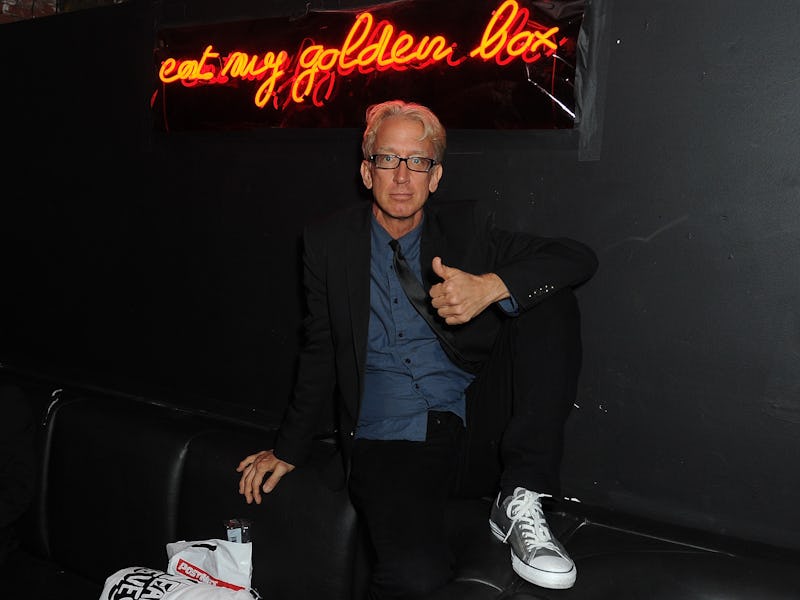Andy Dick Used Judd Apatow's ‘Love’ and Social Media to Apologize, But Missed the Point
The 'Newsradio' comedian's cathartic appearance as himself in the Netflix show makes it difficult to ignore its real world context.

Much has been made, in several publications — but most notably in Vox — about Judd Apatow’s inclusion of actor, comedian and writer Andy Dick in his new Netflix production, the Paul Rust-helmed series Love. Dick’s central role in the show’s middle episode — playing himself — is an unexpected detour in the series, meant as an intense exploration of addiction. However, it seems incommensurate with the Gillian Jacobs character’s vices on the show, which Dick’s reflections are meant to reflect back upon, and therefore feels misplaced and heavy handed.
Even if you like the way this episode functions dramatically, though, it’s hard to get past the troubling real-world parallels to Dick’s own actions. As critics have pointed out, Dick spends the episode blaming all his problems on substance abuse, and speaks offhandedly about being “gropey” when he’s under the influence. Even if we’re meant to view Dick as a cautionary tale or a tragic figure, it’s unclear if the show is tacitly endorsing his lack of self-awareness — that the source of the problem goes deeper than the object of addiction itself.
Love’s release, and Dick’s small newfound spotlight, coincided with a hopeful and flowery message on Dick’s official Facebook page. He encouraged any addicts reading to attend a rehab facility called SOBA, which kept him the most sober for the longest period in many years (15 1/2 months):
“One of my kids checked into SOBA Recovery Center and got sober. I was skeptical, having already done my time at over 13 rehabs costing hundreds of thousands of dollars. Three months into my son’s sobriety, I threw in the towel and checked myself into Soba. I had nothing to lose. I knew I was going to die soon anyways. That was 15 and a half months ago. Today, I can say that Soba has given me my life and my family back. We are all kicking butt and loving life and each other!”
How do we reconcile all this with Dick’s documented cases of public exposure and assault, some of which were prosecuted and some not? Vox’s article has the full list of known cases, but to highlight a few: in 2011, he also rubbed his genitals in a patron’s face at a comedy show. He’s been arrested for theft as recently as 2014. The most disturbing case on record involves the comedian “‘grabb[ing] and fondl[ing] the breast of a 17-year-old girl before pulling her top down.” Sounds eerily close to “gropey.”
“I think he likes being fucked up. He just loves it,” his friend Pauly Shore told The Huffington Post off handedly in 2014. “He loves kind of stumbling around and touching guy’s penises and touching chicks’ boobs.”
If Dick wants to make a clean break, it seems like, perhaps, he hasn’t really come to terms with his actions. In a short video he did last year for the Starving Artists Project, there’s a similar attempt to smooth things over. It’s positioned as a half joke, but similarly to his other apologies, there’s little in the way of accepting and identifying his misdeeds:
“It’s been a long, rough, up-and-down, winding, inside-outside, tumbly, rocky road for me, and as everybody seems to know. You can Google that — actually, please don’t.”
He’s also been open about his background, appearing on the VH1 reality show Sober House 1 and in a web talkshow series about his time under house arrest. He’s also been vocal about his stints in rehab and his struggle for self-betterment. Being open about this has felt like a combination of attempts at atonement, and a publicity stunt.
There’s also a matter of other Dick controversies: for instance, his repeated terming of Howard Stern as a “hook-nosed Jew” and other “colorful” comments. Dick’s struggle for self-improvement — especially when placed in the context of a “serious” television show like Love — is meant be something we commend or take seriously. But as it doesn’t quite convince — either in the fictional universe of that show, or in the context of his offenses over the years — perhaps we should really take this one with a grain of salt.
Dick still has connections in the comedy community — thus, presumably, his placement on the Apatow-produced show. He’s on respected podcasts, and he’s farily active as a performer. With every resurgence for some new relapse or offense, he maintains his irreverent demeanor and humor. Dick’s apologies are part of a cycle; his saga has not been a simple lead-up to one cathartic moment of atonement on a “serious,” comedy-auteur-helmed show.
You’ll still be hard-pressed to find any statements from Andy Dick apologizing for any of his crimes. The basic stance on his misdeed— separated from addiction — seems to be much the same these days as it was in 2012, when he gave an outrageously prickly interview to a reporter at popcultureaddict.com:
“The only time they talk about bad shit about me is when they don’t watch my stuff. It’s when they watch my personal life. The reason it’s called personal is because it’s me. It’s personal.”